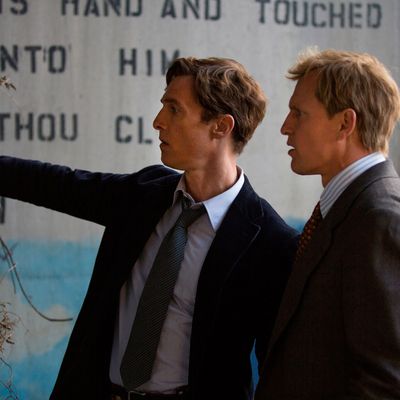
The True Detective season finale is Sunday, and many people are excited to finally solve the show’s big mysteries: Who is the “yellow king”? What is Carcosa? Is lawnmower man also spaghetti-face man? What do the twig totems represent? Are we gonna get to the bottom of this masked-cult thing or what? I get why fans might be interested in the answers to these questions, but weirdly, I do not care at all — and not because I dislike TD. I like True Detective a lot! I just don’t care about its detective-ing. Truly.
I care about the relationship between Rust and Marty, and if the whole show were just Rust spewing philosophy-tinged bullshit and Marty giving him “you gotta be kidding me” glances, I’d be fine with that. I want to know what happened between 2002 and 2007 on the show, and I want to know how Rust became the Rust of today, how Marty now goes years without talking to his children, how Rust and Marty’s partnership continues to rattle around in each of their heads. I like the cinematography and how humid everything seems. I like the Big Hug Mug. I think “Reggie LeDoux” is a really good name for a TV character.
But I actually do not care at all about “solving” the crime of who killed Dora Lange — and neither does the show, really, since we know next to nothing about her or why someone might miss her. Her murder and its seemingly affiliated child rapes are of course very disturbing, but TD is much more concerned with atmosphere than action. Even the show’s biggest “action” sequence, episode four’s famous six-minute-long unbroken take, does not have a lot to do with the show’s ostensible main case. We’ve met a lot of people who don’t “matter” to the plot — a lot of weary sex workers, Joel Theriot’s castrated associate, bikers, partiers, teens. If there were a Spoon River Anthology of the characters on this show, I would read it, because mopey people have rich interior lives, too, and the show hasn’t given anyone much depth except Rust and Marty. And while the two of them do talk about their police work, they mostly talk about themselves and each other.
The show feels ominous, all the time, whether it’s lone cars cruising empty back roads that just barely stave off the encroaching vegetation, or the industrial plants that loom off in the near distance, or the weird alienation of being in a house of worship that’s not your own. Over and over, the show creates the sensation of wait, this shouldn’t be here, be it LeDoux in his freaky gas-mask-and-jock-strap ensemble, the grown-over ruins of a former church, or Audrey’s inappropriate drawings. Given that True Detective is a cop show, I assume Rust and Marty will figure out whoever the real killer (or killers) are, and perhaps that will feel like resolution to some fans. Resolution to me will be Rust and Marty coming to terms with one another, finding the aspects of themselves and each other that they still respect, and being able to part amicably. If they close the Dora Lange case, that’s gravy.
When I want to watch a show about committing or solving murders (or both!), I have plenty of choices. But if I want occult-tinged photos, surprisingly meaningful broken tail lights, and captivating monologues about the nature of man, family, identity, time, faith, and purpose, True Detective is perhaps my only option.




